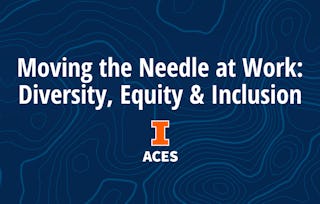Do you want to promote diversity and inclusion? This course will empower and equip you to develop inclusive cultures where everyone feels valued and respected. You will learn how highly inclusive leaders from around the world use processes of social influence to interact effectively with individuals from a wide variety of backgrounds. You will deepen your understanding of the benefits of diversity. And, you will explore a wealth of perspectives and practices to help you to reap those benefits.

Gain next-level skills with Coursera Plus for $199 (regularly $399). Save now.

Inclusive Leadership: The Power of Workplace Diversity

Instructor: Brenda J. Allen
62,164 already enrolled
Included with
(1,788 reviews)
Recommended experience
What you'll learn
How to value & respect others to cultivate inclusion.
Signature traits of inclusive leaders.
Communicate with diverse individuals to achieve goals.
Skills you'll gain
Details to know

Add to your LinkedIn profile
12 assignments
See how employees at top companies are mastering in-demand skills

There are 4 modules in this course
This module provides perspectives on inclusion. We will explore the meanings of inclusion and why inclusion is important for promoting workplace diversity. The lessons will provide a foundation for becoming a highly inclusive leader. The first lesson defines inclusion. The second and third lessons describe and give examples of four factors of inclusion (belonging, uniqueness, equity, and non-discrimination). The fourth lesson discusses diversity in the workplace. It also explains how organizations benefit from inclusion. And it clarifies the relationship between inclusion and diversity. The module concludes with a Spotlight on The Workplace (Lesson 5). The Resources section of our course has: 1. A glossary of key concepts from this module 2. A Next Steps list to help you apply what you've learned in each module 3. An Inclusive Leadership Self-Assessment, and other materials to enhance your learning. Please check the Resources section regularly because I will periodically add and update materials.
What's included
6 videos12 readings3 assignments2 discussion prompts
In this module, you will learn perspectives on inclusive leadership. The first lesson reviews traditional theories of leadership and offers the definition of leadership that we will use in our course. The second lesson explains how we define inclusive leadership. The next two lessons delve into self-awareness, a crucial aspect of inclusive leadership. The module concludes with a lesson on the benefits of inclusive leadership and a Spotlight on Privilege. Please note that the Resources section of our course has a glossary of key concepts from this module. The Resources section of our course has: 1. a glossary of key concepts from this module, and 2. a Next Steps list to help you apply what you've learned in this module, and a variety of other materials to enhance your learning. Please check the Resources section regularly because I will be adding and updating materials.
What's included
9 videos17 readings4 assignments2 discussion prompts
In this module, we will explore six signature traits of inclusive leadership. Researchers Bernadette Dillon and Juliet Bourke conducted a large-scale international project to study how leaders around the world were responding to changes related to inclusion. They identified six signature traits of highly inclusive leaders. The first lesson provides an overview of the six traits. The next lessons offer an overview of each trait and explain how inclusive leaders enact those traits. The module concludes with a Spotlight on Implicit Bias. The Resources section includes: 1. a glossary of key concepts from this module, and 2. a Next Steps list to help you apply what you've learned in this module. Please check the Resources section regularly because I will often add and update materials.
What's included
10 videos19 readings2 assignments2 discussion prompts
In this module, we’ll explore a variety of communication practices related to the six signature traits of inclusive leaders. Communication refers to the wide variety of ways that humans share meaning with one another, including communicating with oneself! Each lesson in this module provides information and ideas for how to communicate inclusively - how to show others that they are valued and respected. First, we will explore a few communication topics that are especially relevant to members of non-dominant groups in the workplace. Then, we'll delve into intrapersonal communication, listening, microaggressions, micro-affirmations, feedback, and inclusive meetings. The module concludes with a Spotlight on Power. The Resources section of our course has: 1. a glossary of key concepts from this module, 2. a Next Steps list to help you apply what you learned in this module, and 3. a reading entitled, Power Matters.
What's included
10 videos20 readings3 assignments2 discussion prompts
Instructor

Offered by
Explore more from Education
 Status: Free Trial
Status: Free Trial Status: Preview
Status: PreviewUniversity of Illinois Urbana-Champaign
 Status: Preview
Status: PreviewUniversity of Michigan
 Status: Free Trial
Status: Free TrialJohns Hopkins University
Why people choose Coursera for their career




Learner reviews
1,788 reviews
- 5 stars
88.93%
- 4 stars
9.89%
- 3 stars
0.72%
- 2 stars
0.22%
- 1 star
0.22%
Showing 3 of 1788
Reviewed on May 17, 2021
I thoroughly enjoyed the course, thank you. A great facilitator who keeps one engaged the whole time. It certainly helped me to be a more active listener. Good materials to supplement lessons.
Reviewed on May 31, 2021
Very useful information that I feel we think we understand but really do not. So I really learned allot and this allowed for me to further look into other concepts I am not too familiar with.
Reviewed on Jun 17, 2021
A fantastic and enlightening course, the resources this course provides are extremely valuable to anyone or any organisation looking to increase their diversity through inclusive leadership.
Frequently asked questions
To access the course materials, assignments and to earn a Certificate, you will need to purchase the Certificate experience when you enroll in a course. You can try a Free Trial instead, or apply for Financial Aid. The course may offer 'Full Course, No Certificate' instead. This option lets you see all course materials, submit required assessments, and get a final grade. This also means that you will not be able to purchase a Certificate experience.
When you purchase a Certificate you get access to all course materials, including graded assignments. Upon completing the course, your electronic Certificate will be added to your Accomplishments page - from there, you can print your Certificate or add it to your LinkedIn profile.
Yes. In select learning programs, you can apply for financial aid or a scholarship if you can’t afford the enrollment fee. If fin aid or scholarship is available for your learning program selection, you’ll find a link to apply on the description page.
More questions
Financial aid available,





